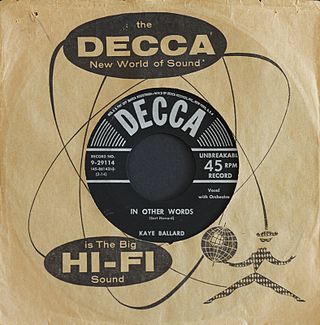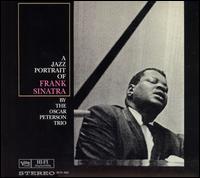Related Research Articles
The 1st Annual Grammy Awards were held on May 4, 1959. They recognized musical accomplishments by performers for the year 1958. Two separate ceremonies were held simultaneously on the same day: one in the Beverly Hilton Hotel in Beverly Hills, California, and the other in the Park Sheraton Hotel in New York City. Ella Fitzgerald, Count Basie, Domenico Modugno, Ross Bagdasarian, and Henry Mancini, each won 2 awards.

"Fly Me to the Moon", originally titled "In Other Words", is a song written in 1954 by Bart Howard. The first recording of the song was made in 1954 by Kaye Ballard. Frank Sinatra's 1964 version was closely associated with the Apollo missions to the Moon.
"Baubles, Bangles, & Beads" is a popular song from the 1953 musical Kismet, credited to Robert Wright and George Forrest. It's based on an 1881 piece by Russian composer Alexander Borodin.
"Lover" is a popular song composed by Richard Rodgers with lyrics by Lorenz Hart. It was sung in the movie Love Me Tonight (1932) by Jeanette MacDonald.
"April in Paris" is a popular song composed by Vernon Duke with lyrics by Yip Harburg in 1932 for the Broadway musical Walk a Little Faster. The original 1933 hit was performed by Freddy Martin, and the 1952 remake was by the Sauter-Finegan Orchestra, whose version made the Cashbox Top 50. Composer Alec Wilder writes, "There are no two ways about it: this is a perfect theater song. If that sounds too reverent, then I'll reduce the praise to 'perfectly wonderful,' or else say that if it's not perfect, show me why it isn't."
"Moonlight in Vermont" is a popular song about the U.S. state of Vermont, written by John Blackburn (lyrics) and Karl Suessdorf (music) and published in 1944. It was introduced by Margaret Whiting in a 1944 recording.
"In the Wee Small Hours of the Morning" is a 1955 popular song composed by David Mann, with lyrics by Bob Hilliard. It was introduced as the title track of Frank Sinatra's 1955 album In the Wee Small Hours.
"Too Marvelous for Words" is a popular song written in 1937. Johnny Mercer wrote the lyrics for music composed by Richard Whiting. It was introduced by Wini Shaw and Ross Alexander in the 1937 Warner Brothers film Ready, Willing, and Able, as well as used for a production number in a musical revue on Broadway. The song has become a pop and jazz standard and has been recorded by many artists.
"Dancing in the Dark" is a popular American song, with music by Arthur Schwartz and lyrics by Howard Dietz, that was introduced by John Barker with Tilly Losch dancing in the 1931 revue The Band Wagon. The song was first recorded by Bing Crosby on August 19, 1931 with Studio Orchestra directed by Victor Young, staying on the pop charts for six weeks, peaking at #3, and helping to make it a lasting standard.
"I've Got the World on a String" is a 1932 popular jazz song composed by Harold Arlen, with lyrics written by Ted Koehler. It was written for the twenty-first edition of the Cotton Club series which opened on October 23, 1932, the first of the Cotton Club Parades.
"Exactly Like You" is a popular song with music written by Jimmy McHugh and lyrics by Dorothy Fields and published in 1930. The song was introduced by Harry Richman and Gertrude Lawrence in the 1930 Broadway show Lew Leslie's International Revue which also featured McHugh and Fields's "On the Sunny Side of the Street".
"How About You?" is a popular song composed by Burton Lane, with lyrics by Ralph Freed. It was introduced in the 1941 film Babes on Broadway by Judy Garland and Mickey Rooney.
"Witchcraft" is a popular song from 1957 composed by Cy Coleman with lyrics by Carolyn Leigh.
"I Won't Dance" is a song with music by Jerome Kern that has become a jazz standard. The song has two different sets of lyrics: the first written by Oscar Hammerstein II and Otto Harbach in 1934, and second written by Dorothy Fields in 1935.
"You'd Be So Nice to Come Home To" is a popular song written by Cole Porter for the 1943 film Something to Shout About, where it was introduced by Janet Blair and Don Ameche. The song was nominated for the Academy Award for Best Original Song in 1943 but lost to "You'll Never Know".
"Old Devil Moon" is a popular song composed by Burton Lane with lyrics by Yip Harburg for the 1947 musical Finian's Rainbow. It was introduced by Ella Logan and Donald Richards in the Broadway show. The song takes its title from a phrase in "Fun to Be Fooled", a song that Harburg wrote with Harold Arlen and Ira Gershwin for the 1934 musical Life Begins at 8:40.

A Jazz Portrait of Frank Sinatra is a 1959 album by The Oscar Peterson trio, recorded in tribute to singer Frank Sinatra by interpreting songs associated with Sinatra.
"Guess I'll Hang My Tears Out to Dry" is a 1944 torch song and jazz standard, with music by Jule Styne and lyrics by Sammy Cahn. It was introduced on stage by film star Jane Withers in the show Glad To See You, which closed in Boston and never opened on Broadway. The duo Styne and Cahn had previously written songs for several of Withers' films.
"Blame It on My Youth" is a jazz standard written by Oscar Levant (music) and Edward Heyman (lyrics) in 1934.
"Where Are You?" is a popular song composed by Jimmy McHugh, with lyrics by Harold Adamson. The song was written for the 1937 film Top of the Town and was originally performed by Gertrude Niesen. Niesen also made a commercial recording of the song for Brunswick Records and this was popular.
References
- ↑ "genius.com". genius.com. Retrieved June 20, 2020.
- ↑ "www.allmusic.com". allmusic.com. Retrieved December 1, 2024.
- ↑ "www.allmusic.com". allmusic.com. Retrieved December 4, 2024.
- ↑ "www.allmusic.com". allmusic.com. Retrieved December 5, 2024.
- ↑ "allmusic.com". allmusic.com. Retrieved June 20, 2020.
- ↑ "www.allmusic.com". allmusic.com. Retrieved December 5, 2024.